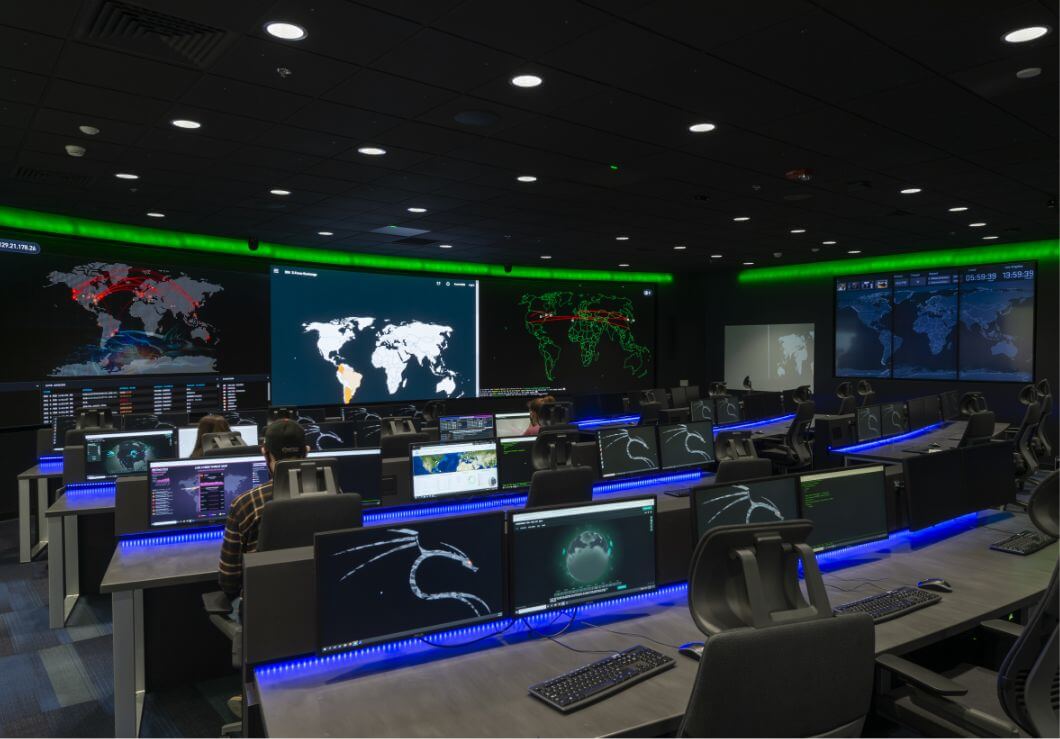Shaping the Future of Cybersecurity
RIT: Shaping the Future of Cybersecurity
In the ever-evolving landscape of cybersecurity, the demand for skilled professionals has never been higher. RIT’s academic programs, cutting-edge research, and innovative training opportunities position RIT as a national leader in cybersecurity excellence.
In the ever-evolving landscape of cybersecurity, the demand for skilled professionals has never been higher. RIT’s academic programs, cutting-edge research, and innovative training opportunities position RIT as a national leader in cybersecurity excellence.
Cybersecurity Research
RIT is pioneering innovative solutions and advancing the boundaries of knowledge to address the ever-evolving challenges presented by the field. Our research agenda is powered by more than forty faculty members across multiple RIT colleges, which informs our research with perspectives from engineering, psychology, public policy, and more.
RIT is recognized as a National Center for Excellence in both Cybersecurity Education and Research by the Department of Homeland Security and National Security Agency.
Learn more about cutting-edge cybersecurity research at RIT
RIT is recognized as a National Center for Excellence in both Cybersecurity Education and Research by the Department of Homeland Security and National Security Agency.

Securing the Future:
Vehicle-to-Vehicle Communications
Driver assistance and autonomous driving systems have the potential to save tens of thousands of lives every year. However, the advanced wireless systems for connected vehicles that will make these technologies possible are vulnerable to cyberattacks. Hanif Rahbari, an assistant professor of cybersecurity at RIT, recently earned the prestigious NSF CAREER Award for his work to enhance connected vehicle security. Rahbari is developing and validating new protocols to secure the growing connected vehicle ecosystems already in use today. The techniques he creates will also protect wireless communications among vehicles from quantum-related attacks in the future.

AI at the Helm:
Machine Learning and Security
RIT’s commitment to cutting-edge research extends to the realm of artificial intelligence. Ashique KhudaBukhsh, an assistant professor of software engineering at RIT, employs machine learning in large data sets to detect and better understand patterns in a socio-political context. KhudaBukhsh’s insights were recently included in a Sunday New York Times cover story highlighting research utilizing machine learning to glean insights about the Jan. 6 Capitol Riot. KhudaBukhsh’s recent research highlights Large Language Models (LLM) limitations, which has led to YouTube fixing unsafe transcriptions in children’s videos. His research, at the intersection of machine learning and cybersecurity, is being used to develop solutions to emerging threats.

Beyond the Headlines:
Deepfakes, Cryptography, and Detection Systems
Matt Wright, professor and chair of the department of cybersecurity, leads RIT’s efforts in tackling challenges posed by deepfakes and developing sophisticated detection systems. Using the latest in AI research, the DeFake Project is building software designed specifically to help journalists uncover deep fakes–videos so believable that even those charged with vetting the content could inadvertently share them. The team is one of eight winners of the Knight Foundation’s AI and the News Open Challenge.
Cybersecurity Education
Raising the Bar and Championing Excellence
RIT offers a robust suite of academic programs across key areas of cybersecurity and the disciplines it impacts, including analytics, artificial intelligence, computer science, engineering, machine intelligence, intelligent systems, robotics and cybernetics, and more.
19th
Best Cybersecurity BS Degree
U.S. News & World Report, 2024
100%
Outcome Rate Cybersecurity BS Program
96%
Outcome Rate Cybersecurity MS Program
RIT’s Ph.D. in Computing and Information Sciences
Students can tackle novel problems with a doctorate degree that caters to the diverse needs of professionals seeking advanced expertise in cybersecurity and artificial intelligence and those inclined to develop and design the future of cybersecurity and AI via research.
Ph.D. Student Experience at RIT: Cybersecurity
Nurturing Top-Tier Talent
RIT’s cybersecurity club serves as a hub for students to hone their skills through hands-on experiences, competitions, trainings, and workshops.
Collegiate Penetration Testing Competition
RIT hosts the world’s best cybersecurity students. Our cybersecurity team won first place in 2021, took second place in 2020, and has been a five-time regional first place winner since 2018.
State-of-the-Art Facilities
A collection of advanced research facilities where faculty and students conduct cutting-edge, award-winning research.
ESL Global Cybersecurity Institute at RIT
ESL Global Cybersecurity Institute
Educating and training cybersecurity professionals; developing new cybersecurity and AI-based knowledge for industry, academia, and government; and providing systems and network security services for critical infrastructure and small- and mid-sized organizations.
Cyber Range and Training Center
Delivering a unique training experience for corporate leaders and IT security professionals, RIT’s cutting-edge technology allows us to create realistic threat scenarios on a scale that mirrors massive global businesses, with a focus on health care, energy, and finance.
Wireless IoT Security and Privacy Lab
Making wireless systems more secure, with an emphasis on emerging connected vehicle ecosystems, next-generation Wi-Fi and cellular systems, electronic warfare, and coexistence in shared spectrum, in order to protect these growing applications from various privacy, spoofing, and denial-of-service attacks.
Preparing the Cybersecurity Workforce of the Future
Two RIT programs train and build the next generation of cybersecurity professionals.
Veterans Transition Program
Training veterans through a certificate program that actively recruits and supports veterans to transition into high-demand civilian cybersecurity careers. RIT–backed by $2.5 million in funding from the National Security Agency–is leading eight universities in developing these certificate programs.
CyberCorps® Scholarship for Service
Providing scholarships for full-time students who then serve in a cybersecurity role for the federal government after graduation. Funded by the National Science Foundation, CyberCorps increases and strengthens the number of federal information assurance professionals that protect the government's critical information infrastructure.
Google Cybersecurity Clinic
As one of the first universities to receive support from Google’s Cybersecurity Clinics Fund, RIT will train new cybersecurity professionals while providing services to the public.
West Point Military Cyber Defense Institute
RIT researchers are building a serious video game to help cities prepare for, prevent, and respond to cyberattacks.
S&P Report Card
RIT’s cybersecurity experts worked with credit analysts from S&P Global Ratings to better frame the impact that cyber risk plays on an organization’s creditworthiness.











